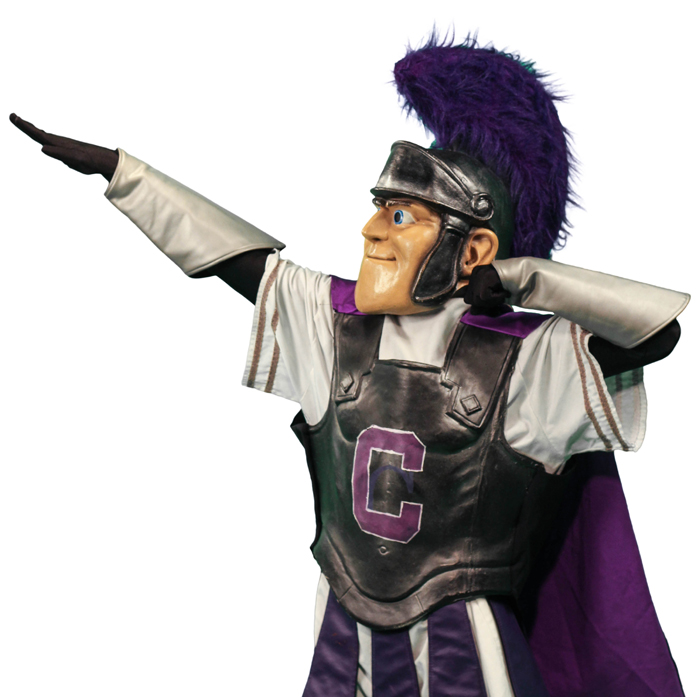Are you proud to be called a “Crusader?”
In an interview with The Chimes, President Denvy Bowman said a significant number of alumni and faculty, including himself, would like to see a change in mascot. Over the last decade, momentum for change has been building among students as well.
However, no complete proposal for a new university mascot has been presented.
Bowman said he has “heard a million ideas” for a new mascot but has not heard a pitch that would resonate with everyone.
“I think we’re at the tipping point, and having student support is key to making change,” said Bowman. “Not only do I hope folks would have fun in building a new identity with a new mascot, but I think students ought to play the primary role and lead us to the next iteration of our mascot.”
And just how might students not only open a discussion, but also present a complete pitch?
With Student Government elections coming up, Bowman asks if there is a candidate who is willing to help come up with a process inclusive to students, alumni, faculty, and the athletic department.
Student Government Vice President Marshall Lyons said all members of the community are welcome to come forth with concerns or propositions that they wish for the senate to pursue.
“If this topic is indeed of interest to the student body, we encourage members of the community to come discuss their views and potential solutions with us so that we may take action,” said Lyons.
Student Government holds biweekly meetings at 9 p.m. Tuesday nights in the Weiler Conference Suites.
Provost Richard Ashbrook said faculty could serve as resources to the discussion and help the student leaders look to both present and future word attributions.
Both Bowman and Ashbrook agreed that changing the school’s colors from purple would be very difficult.
According to the book “Chronicle of Change: Capital University 1950-2000,” several people voiced concern over the university’s nickname the Fighting Lutherans, believing the use of the word “Lutheran” to be too trivial for an institution of higher learning.
Possible names considered included Purple Knights, Crusaders, and Saints. In 1957, the football team was supposedly referred to as the “Purple Knights.”
Yet, in 1963, the Campus Council voted to change the name to Crusaders, and, for the last 52 years, Capital has retained the nickname. At least six other “Crusader” Christian institutions, including the College of the Holy Cross in Massachusetts and Valparaiso University in Indiana, have stayed true to their name.
Yet, a handful of colleges have done away with the moniker on moral grounds, rebranding themselves into Sea Lions, Cardinals, and Thunder.
Last winter, Fox News reported Maranatha Baptist University in Wisconsin dropped its 50-year-old “Crusaders” nickname to adapt to the changing global society, sparking controversy among Capital staff and students.
At the time, Capital’s spokeswoman Nichole Johnson told Fox News the nickname was not an issue on Capital’s campus.
Director of The Office of Diversity and Inclusion (ODI) Almar Walter thinks it is time for the university and students to facilitate a campus-wide conversation.
“They are students who feel passionately and are proud of their faith, but I think the fundamental thing is ‘Crusaders’—what does that mean to the community? How do we embrace that? Most students respond fondly but others, not so much. They’re frightened,” said Walter. “…Good dialogue about why people feel the way they feel is a necessity.”
Walter said Cappie is occasionally a topic of conversation at Pizza and the Paper, an ODI event held on the second and fourth Fridays of every month where students from different backgrounds discuss current events.
“It would be premature for me to say that [the students] were uncomfortable, but you could sense it in their posture, tone, and the type of questions asked that they were really trying to figure out how this mascot came about,” said Walter.
While Cappie’s stock mascot costume design is more aligned with a Roman legionnaire, the origin of the term “Crusader” traces back to when medieval knights, under the rule of the Pope, flooded into the Holy Land and committed mass killings of Muslims. These crusades lasted from the 11th to the 13th century.
“The individuals that I’ve heard express an affinity for our mascot, it’s not so much an affinity to Crusaders but an affinity to Capital. It comes to mean the same thing,” said Ashbrook. “I don’t hear anyone, even those in favor of ‘Crusader,’ advocating for a Crusader.”
Despite Ashbrook’s train of thought, senior religion major Hayden Brown believes Cappie is offensive.
“I don’t believe that everything a minority finds offensive should be augmented to appease that minority, but in light of the conflict in the the Middle East…and in light of the fact that Capital is a Christian university, [the mascot] is particularly harmful to the Islamic students on campus and anyone who is concerned with the image of Muslims in America,” said Brown.
Brown said his solution is to replace Cappie with “a mascot that doesn’t represent the slaughtering of a religious group.”
“Being called a Capital Crusader is akin to being called Capital Nazis or Capital Slavers,” said Brown.

